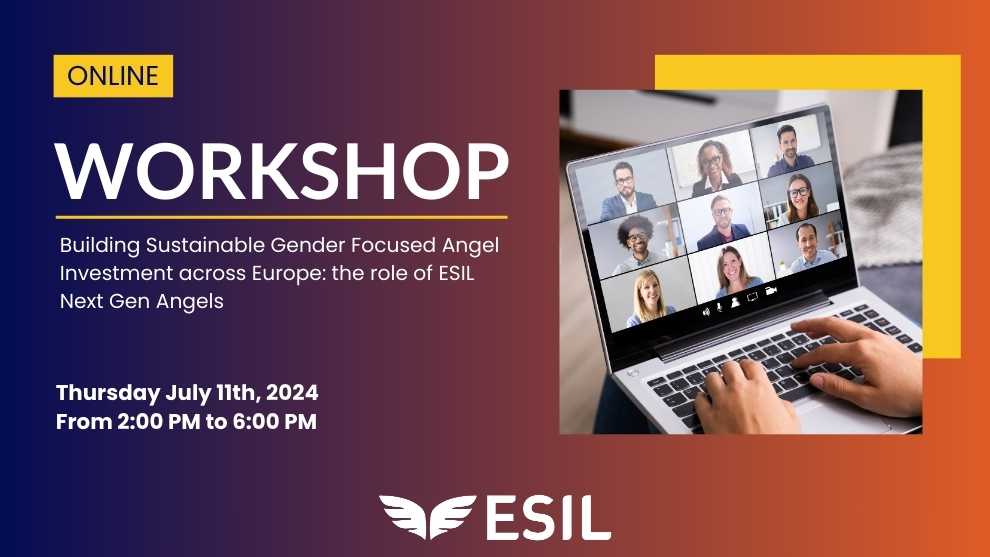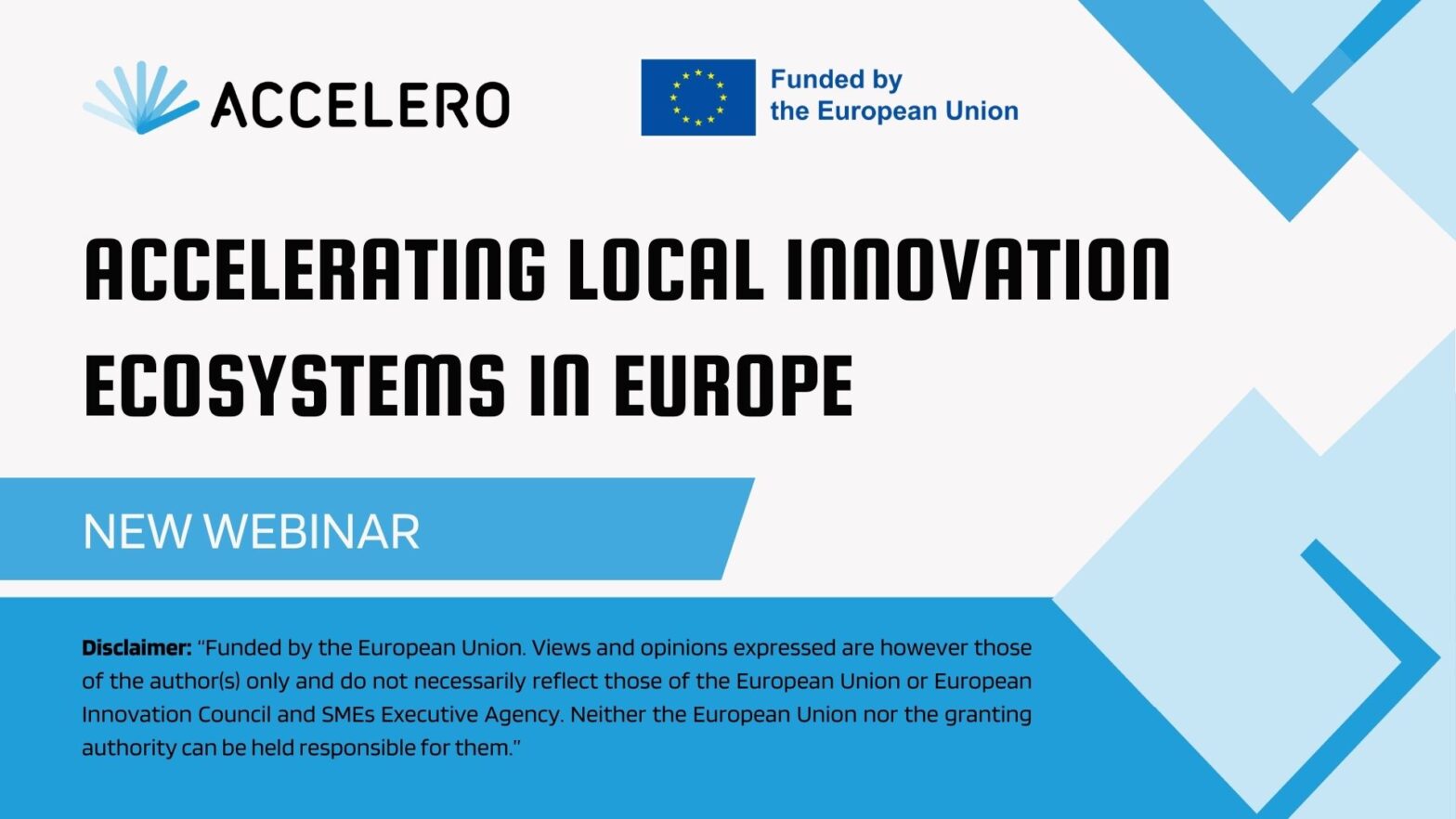EU|BIC Essentials Training Track 2024 | Shaping, Supporting, Scaling Digital Innovation Ecosystems

Training week: online, 30 September-04 October 2024 (10-12 CET)
Welcome to the 8th edition of the EU|BIC Essentials Training, a cornerstone capacity-building event designed to highlight the pivotal role EU|BICs play in driving digital innovation across regional ecosystems.
Through five carefully designed modules participants will delve into critical areas of digital innovation exploring strategic approaches and practical tools necessary to foster and sustain digital transformation within their ecosystems. Each session is designed to equip participants with the knowledge and skills to navigate and lead in the rapidly evolving digital landscape for business and entrepreneurship support organisations.
This year’s training will focus specifically on European Digital Innovation Hubs (EDIHs) and the role European Business Innovation Centres (EU|BICs) play in the digital transformation processes of their ecosystems.
Quick menu: Module 1 | Module 2 | Module 3 | Module 4 | Module 5
Training Content and Schedule
The training will be delivered online over five sessions of 2 hours each, from 30 September to 4 October 2024, comprising four training modules and a final debriefing session.
The 2024 EU|BIC Essentials training aims at offering EU|BICs and other Business Support Organisations the opportunity to embark on a learning journey covering the following modules and topics:
Module 1: Digital Innovation & Digital Transformation: Setting the Framework – Monday, 30 September 2024, 10:00 – 12:00
This module introduces foundational concepts and frameworks for digital innovation and transformation. It explores the role of European Digital Innovation Hubs (EDIHs) and how they contribute to the EU Digital Decade Policy Programme, addressing digital skills, innovative tools, and cross-border cooperation to bridge the digital divide.
Module 2: The EU|BIC Digital Innovation Strategy: Ecosystems, Business Models, and Governance – Tuesday, 01 October 2024, 10:00 – 12:00
Participants will learn strategic approaches for fostering and sustaining digital innovation within their ecosystems. The module covers the development of robust business models, effective governance structures, and leveraging expertise and infrastructure to support digital transformation initiatives.
Module 3: Essential Incubation Services: Fostering Digital Innovation for Startups and SMEs – Wednesday, 02 October 2024, 10:00 – 12:00
This module identifies critical incubation services for digital native startups and traditional SMEs. It provides insights into balancing the needs of both types of companies and shares successful strategies from other incubators to drive digital innovation across diverse company profiles.
Module 4: EU|BIC Deep Dive #2: Incubation Services for Deep Tech Ventures – Thursday, 03 October 2024, 10:00 – 12:00
Focusing on deep tech ventures, this module explores strategies for designing, implementing, and scaling specialized incubation services. Participants will learn about the unique challenges of deep tech startups, essential ecosystems, funding opportunities, and strategic partnerships necessary for their growth.
Module 5: EU|BIC Essentials Debriefing – Friday, 04 October 2024, 10:00 – 12:00
The final module is a debriefing session allowing participants to reflect on the week’s training. In breakout rooms, they can exchange ideas, discuss ongoing practices, and explore future developments with trainers and peers, consolidating their learning experience.
Takeaways
In this training, participants will increase their knowledge and hands-on skills in:
- Digital Innovation & Digital Transformation: Understanding the foundational concepts and frameworks for digital innovation and transformation, particularly within the context of EU|BICs and their ecosystems.
- Digital Innovation Strategies: Develop comprehensive strategies that include ecosystems, business models, and governance structures tailored to support digital transformation initiatives.
- Incubation Services: Identifying and implementing critical incubation services for both digital native startups and traditional SMEs, with insights into balancing their differing needs.
- Deep Tech Ventures: Designing and scaling incubation services specifically for deep tech ventures, including leveraging ecosystems, and strategic partnerships.
- Peer Exchange and Practical Insights: Engaging in peer exchanges and practical discussions to consolidate learning and explore future developments in digital innovation support.
Target audience
- EU|BICs’ incubation managers and operational staff
- Digital Innovation Hubs (DIHs) and European Digital Innovation Hubs (EDIHs)
- Business support organisations, incubators, accelerators, start-up hubs
Registration and information
The EU|BIC Essentials Training is free for Certified EU|BIC members and EU|BIC Associate Members.
Enrolment for non-members is priced at €399€ (excl. VAT) which allows access for two team members per organisation. The persons attending from each organisation can be different from one module to another; however, to receive the learning certificate the attendee needs to participate to all modules.
Non-members enrolled in the training can apply for full reimbursement of the admission costs if the organisation applies for a membership (Certified EU|BIC) within three months from the start date of the training.
A learning certificate is issued by EBN to each participant at the end of the training.
Module 1 | Digital Innovation & Digital Transformation: setting the framework
Date & time: Monday, 30 September 2024, 10:00 – 12:00
Module Description
In this module we will first provide the foundational concepts and frameworks for digital innovation and transformation to better understand how innovative startups and SMEs with the support of EU|BICs can contribute to the goals set in the EU Digital Decade Policy programme. The module will then look at the experience of Digital Innovation Hubs to reflect on the role EU|BICs and Innovation/Entrepreneurship Support Organizations can play in fostering digital skills, incentivising the take-up of innovative digital tools by SMEs, and tackling the digital divide across different European territories, through cross-border cooperation between European local actors.
In this module, we will delve into:
-
- The key drivers of the digital transition of European SMEs: technologies, skills and business models with Justina Bieliauskaite, Innovation Director at European Digital SME Alliance
- Overview of the state of the art of digital innovation in EU
- Digital innovation and new business models (concrete examples of digital transition)
- Digital divide: how to support startups and SMEs taking up digital tools while being resilient/sustainable
- How to build sustainable digital innovation value chains
- Rethinking the role of intermediaries: How can Entrepreneurship Support Organizations rethink their role in the Digital Transition of their local ecosystems? with Elena Cigliano, Head of Strategic Marketing and Innovation Services at EU|BIC Associate LINKS Foundation
- The role Innovation/Entrepreneurship Support organizations play in the ecosystem, tackling the digital divide to achieve greater impact
- The strategic implementation of Digital Innovation Hubs in Piemonte Region
- Practical insights from the EDIHs’ world on how to promote digital skills, enable digital tools and foster cross-border collaboration with Maria Roca, Digital Innovation Hubs Lead | Senior Project Manager at EU|BIC Associate Fundingbox
- How to use EU-funded opportunities to a) develop digital skills; 2) support the uptake of digital tools; 3) enable cross-border collaboration.
- Concrete examples of how to use these funding opportunities to re-organize BSOs and better serve the clients.
- Final dynamic session > mapping out opportunities and initiatives participants are currently running
- The key drivers of the digital transition of European SMEs: technologies, skills and business models with Justina Bieliauskaite, Innovation Director at European Digital SME Alliance
The take-aways from this session are:
- Current state of the art of the European Digital Innovation landscape (business perspective)
- Technological trends for digital innovation/transformation
- Understanding current gaps of the regional digital innovation ecosystems and the role EU|BICs can play to fill those gaps.
- Grasping EDIHs’ concept and strategy, and their transferability to other contexts.
- Balancing local and transnational dimensions of digital innovation ecosystems to address the digital divide through collaborative approaches among EU|BICs (who are also EDIHs).
Speakers
Justina Bieliauskaite, Innovation Director, European Digital SME Alliance
Elena Cigliano, Head of Strategic Marketing and Innovation Services, EU|BIC Associate LINKS Foundation
Since 2021 she has been the Head of “Strategic Marketing & Innovation Services” at LINKS Foundation, with the mission of positioning the LINKS Foundation as a subject that supports the innovation ecosystem, through support actions, open innovation, business support and technological due diligence, and business creation. She is also in charge of talent management at LINKS, and from 2022 she is responsible for technology transfer and the evaluation and measurement of the Foundation’s impact.
Maria Roca, Digital Innovation Hubs Lead | Senior Project Manager, EU|BIC Associate Fundingbox
| 10.00 – 10.10 | Check in and intro EBN Staff (Moderator and EBN CEO). Training presentation |
| 10.10 – 10.40 | Justina Bieliauskaite, Innovation Director at European Digital SME Alliance |
| 10.40 – 11.00 | Elena Cigliano, Head of Strategic Marketing and Innovation Services at EU|BIC Associate LINKS Foundation |
| 11.00 – 11.10 | Breath, stretch, drink, pause |
| 11.10 – 11.55 | Maria Roca, Digital Innovation Hubs Lead | Senior Project Manager at EU|BIC Associate Fundingbox |
| 11.55 – 12.00 | Conclusions |
| 10.00 – 10.10 | Check in and intro EBN Staff Training presentation |
| 10.10 – 10.50 | Bartosz Józefowski, Deputy Director at EU|BIC Krakow Technology Park, Technology Park department |
| 10.50 – 11.10 | Christian Travier, Managing Director at EU|BIC Laval Mayenne Technopole |
| 11.10 – 11.15 | Breath, stretch, drink, pause |
| 11.15 – 11.55 | Jürgen Jähnert , Chief Executive Officer at EU|BIC associate bwcon Gmbh |
| 11.55 – 12.00 | Conclusions |
Module 3 | Essential Incubation Services: Fostering Digital Innovation for Startups and SMEs
Date & time: Wednesday, 02 October 2024, 10:00 – 12:00
Module Description
This module will identify the essential incubation services every EU|BIC should offer to foster digital innovation for both digital native startups and traditional, or “analogic,” SMEs. Participants will gain insights into how other incubators are driving digital innovation and learn about the tailored incubation services needed based on the company’s development stage.
In this module, we will delve into:
-
- EDIH management: How to effectively run a DIH. The example of the Digital Accelerator of of Latvia (DAoL) with Juris Čeičs, Head of digitalization division at EU|BIC Associate Valmiera Development Agency
- Practicalities on how to manage effectively a European Digital Innovation Hub: key activities to carry out, collaborations with partners, clients’ attraction, etc
- Digital infrastructure : How to renew incubation spaces to provide advanced digital services. The example of EU|BIC Incubatori FVG with Edvin Bevk, Senior expert consultant, and Alessandro Macuz, infrastructure designer at EU|BIC Incubatori FVG
- Building a digital infrastructure. The way to renew incubation spaces making them ready to facilitate digital transformation for startups and SMEs
- Digitalisation tools: Digital audit and success criteria with Jan Wedlich, Business Development Manager at EU|BIC ICUK
- Tools and methodologies to help companies become digitalised.
- Acceleration Zone – innovation runway in Gdansk. The role of Pomeranian Special Economic Zone in creating innovation ecosystem through startups acceleration and digital transformation with Jasmina Zwierz, Project Manager at Gdank Science and Technology Park
- EDIH management: How to effectively run a DIH. The example of the Digital Accelerator of of Latvia (DAoL) with Juris Čeičs, Head of digitalization division at EU|BIC Associate Valmiera Development Agency
-
-
- Effective Incubation and Acceleration strategies and programmes to boost innovation and drive digitalisation processes among startups and SMEs
-
The take-aways from this session are:
- The complexity level of integrate an EDIH inside a Business Support Organisation.
- Key aspects to consider when building a new digital infrastructure for a Business Support Organisation.
- Tested tools and mythologies designed to support digitalisations of Startups and SMEs
- Insights into successful cases/stories used by other incubators to drive digital innovation.
Speakers
Jaśmina Zwierz, Project Manager in the Department of Science and Technology Parks, EU|BIC Associate Gdanks Science and Technology Park
Jasmina is a graduate of International and European Law from the University of Maastricht in the Netherlands and Postgraduate Management Studies at the SGH Warsaw School of Economics.
Jan Wedlich, Business Development Manager, at EU|BIC ICUK
Juris Čeičs, Head of digitalization division, EU|BIC Associate Valmiera Development Agency
Edvin Bevk, Senior expert consultant, EU|BIC Incubatori FVG

Edvin works on European projects, and he is responsible for acceleration and incubation paths for cultural, creative and tourism businesses. He participated in various seminars, in Italy, Slovenia and Croatia, as speaker regarding business planning.
Edvin graduated in Economics and Commerce at the University of Trieste. He is registered in the register of Italian journalists, he has written articles for local newspapers in Slovene and Italian about sport, economy, ICT and travel.
Alessandro Macuz, Senior expert consultant, EU|BIC Incubatori FVG
Isabel Agreda Espatolero, Lead Service & Experience Design at Barrabes.BIZ
| 10.00 – 10.10 | Check in by EBN Staff and Module presentation Isabel Agreda Espatolero from EU|BIC Associate Barrabes.biz |
| 10.10 – 10.35 | Juris Čeičs, Head of digitalization division at EU|BIC Associate Valmiera Development Agency |
| 10: 35 – 10:55 | Edvin Bevk, Senior expert consultant, and Alessandro Macuz, Network Architect at EU|BIC Incubatori FVG |
| 10:55 – 11.00 | Breath, stretch, drink, pause |
| 11:00 – 11:25 | Jasmina Zwierz, Project Manager at EU|BIC Associate Gdanks Science and Technology Park |
| 11:25 – 11:50 | Jan Wedlich, Business Development Manager at EU|BIC ICUK |
| 11:50 – 11:55 | Q&A |
| 11.55 – 12.00 | Conclusions by Isabel Agreda Espatolero from EU|BIC Associate Barrabes.biz |
Module 4 | EU|BIC Deep Dive #2: Incubation Services for Deep Tech Ventures
Date & time: Thursday, 03 October 2024, 10:00 – 12:00
Module Description
This module will delve into the critical strategies and opportunities involved in designing, implementing, and nurturing incubation services specifically tailored for deep tech ventures. Participants will gain valuable insights into encouraging the creation of deep tech startups, fostering an entrepreneurial mindset among researchers, and building robust ecosystems to support their growth and scalability.
Deep tech ventures, characterized by significant scientific or engineering challenges, require specialized incubation programs that address their unique needs. This session will provide practical recommendations, methodologies, and best practices for building and running such programs at different stages of growth. Additionally, it will explore how robust ecosystems and strategic partnerships can be leveraged to support the scaling of deep tech startups.
In this module, we will delve into:
-
- Defining Deep Tech, Core Characteristics and Fostering Venture Creation with Olivier Zephir, Senior Business Advisor at the EU|BIC Technoport SA
- Understanding Deep Tech
- The collaboration between EU|BICs and universities and research institutions to encourage the creation of deep tech startups and foster an entrepreneurial mindset.
- Building and Running Effective Incubation Programs for Deep Tech Ventures with Oliver Hasse, Managing Director at EU|BIC associate INAM Berlin
- Developing tailored support services that address the unique technical and commercial challenges faced by deep tech startups at various growth stages.
- The key components of effective incubation programs tailored to the needs and growth stages of deep tech ventures
- Leveraging Ecosystems for Scaling Deep Tech Startups with Arielle Santé, General Director at EU|BIC IncubAlliance Paris-Saclay
- Forging alliances with universities, research institutions, and industry leaders to create a supportive ecosystem
- Leveraging local and global ecosystems to provide the necessary support for deep tech startups to scale
- Identifying and utilising diverse funding sources, including venture capital, grants, and government initiatives, to support deep tech innovation
- Defining Deep Tech, Core Characteristics and Fostering Venture Creation with Olivier Zephir, Senior Business Advisor at the EU|BIC Technoport SA
The take-aways from this session are:
- Understanding the distinct characteristics and challenges of deep tech ventures.
- Strategies for fostering entrepreneurship among researchers and encouraging deep tech startup creation.
- Design principles and best practices in developing deep tech-focused incubation programs based on their specific needs and growth stages.
- Importance of building robust ecosystems and partnerships to foster innovation and support scalability.
Speakers
Oliver Hasse, Managing Director, EU|BIC associate INAM Berlin
At INAM, Oliver leads initiatives connecting deep tech startups with industry leaders, research institutions, and investors to tackle material challenges of the future. Their work focuses on fostering collaborations that bridge technological advancements with practical industry applications.
With an MBA from ESMT Berlin and specialized training in M&A, restructuring, and entrepreneurship, Oliver is also a seasoned speaker, mentor, and business angel. Their roles at various firms underscore a commitment to igniting innovation and facilitating cross-border growth strategies.
Arielle Santé, General Director, EU|BIC IncubAlliance Paris-Saclay
Bringing over 30 years of experience at the intersection of research and industry, Arielle holds a master’s degree in business, a Ph.D. in strategic management from the University of Paris-Saclay, followed by a post-doctorate on the topic of Industry 4.0. Her career began in luxury business development at Hediard, followed by an international business position in the industrial sector with Aluminium Péchiney. She later founded ASCEO, a consulting firm specializing in management, negotiation, and strategy for public research organizations and innovative companies. Deeply involved in the Paris-Saclay ecosystem, Arielle is committed to unlocking the potential of academic research.
Olivier Zephir, Senior Business Advisor, EU|BIC Technoport SA
| 10.00 – 10.10 | Check in and intro EBN Staff. Module presentation |
| 10:10 – 10:40 | Olivier Zephir, Senior Business Advisor at the EU|BIC Technoport SA |
| 10:40 – 11:10 | Oliver Hasse, Managing Director at EU|BIC associate INAM Berlin |
| 11.10 – 11.15 | Breath, stretch, drink, pause |
| 11:15 – 11:55 | Arielle Santé, General Director at EU|BIC IncubAlliance Paris-Saclay |
| 11.55 – 12.00 | Conclusions by EU|BIC Associate Barrabes.biz |
Module 5 | EU|BIC Essentials Debriefing
Date & time: Friday, 04 October 2024, 10:00 – 12:00
Module Description
Time to look back at the training modules we went through over the last four days and allow for peer exchange. Split into 4 break-out rooms, participants can further exchange with the trainers and with other peers on ongoing practices, ideas for future developments etc.
| 10:00 – 10:15 | Check in and intro EBN Staff. Module presentation |
| 10:15 – 11:30 | Debriefing Sessions > 4 parallel discussion groups |
| 11:30- 11:50 | Parallel sessions highlights |
| 11:50-12:00 | Conclusions |






















